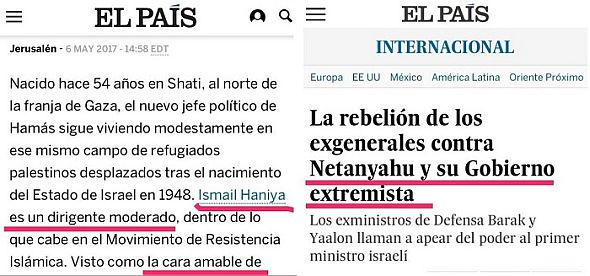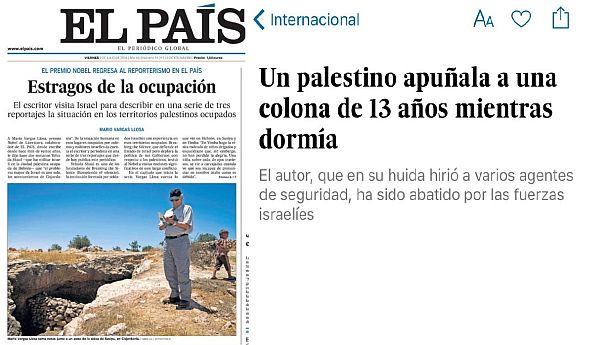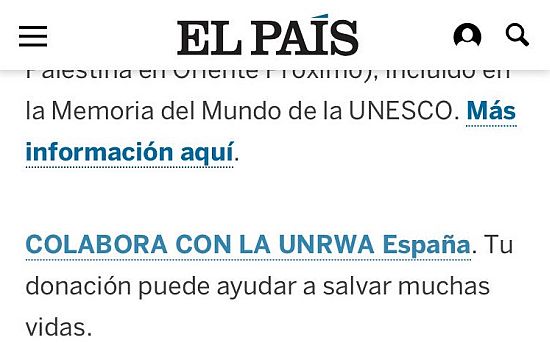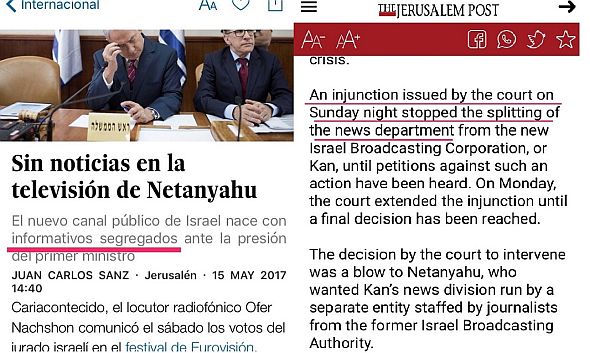Hamas leader Ismail Haniyeh is “moderate” and “pragmatic,” while Israeli Prime Minister Netanyahu leads a “radical” and “extremist” government.
PFLP (Popular Front for the Liberation of Palestine) member Leyla Khaled, who hijacked two passenger planes in the late 1960s, is someone who “comes from a traumatic life experience: the occupation that as a child, in 1948, expelled her and her family from Haifa,” along with “millions of refugees who were forced to leave their homes.”
The Israeli-Palestinian conflict “emanates from the occupation of East Jerusalem and the West Bank” and “the subsequent blockade of the Gaza Strip.” “After the 1967 war, Israel hasn’t stopped colonizing.”
These descriptions are all from the news pages of the largest and most influential newspaper of the Spanish-speaking world, El País, and represent its approach to reporting on the region.

El País claims Hamas leader is moderate and Netanyahu’s government is extremist.
For years, El País advanced an anti-Israeli narrative, at times even toying with overt anti-Semitism, to the point where, in 2009, fourteen US congressmen sent a letter to then-Spanish Prime Minister José Luis Rodríguez Zapatero to express their concern about El País’ systematic publication of “articles and cartoons conveying crude anti-Semitic canards and stereotypes.”
That same year, the Israeli newspaper Haaretz (a notoriously harsh critic of the Israeli government) published Yoav Sivan’s article “Bias in black and white” which noted that “Even in minor stories unrelated to the conflict, El Pais displays a unique combination of sloppiness and unapologetic hatred for Israel.”
The year 2009 marked a turning point. The newspaper changed its approach to the region with more balanced reporting. Tel Aviv ceased to be incorrectly identified as the capital of Israel and articles from the Middle East began to include viewpoints from both sides of the conflict.
Over the past year, however, El País has drifted back to its previous pattern, disregarding the voice of one of the parties in the conflict.
One-Sided Journalism
It is now rare to see the perspectives of any Israeli who does not sharply condemn his or her own country in the newspaper. For example, for the 49th anniversary of the “occupation,” El País published a series of articles, graphics and photographs over the course of a month that were authored by the paper’s correspondent, as well as other envoys to the area. Because these were not time-sensitive, breaking news stories, journalists had the opportunity to contextualize and delve into the background of the conflict. Yet none of the articles included a single voice explaining the situation from an Israeli viewpoint.
On June 30, 2016, Hallel Yaffa Ariel, a 13-year-old Israeli girl, was murdered while asleep in her bed. The next day, El País dedicated its front page and its first two pages to an article entitled “The ravages of the occupation.”
In a separate article inside the paper, the crime was reported as follows:
“A Palestinian stabs a 13-year-old settler in her sleep.”
CAMERA’s Spanish department contacted El País to express concern that the newspaper was dehumanizing the victim by referring to her in this way. The newspaper changed the headline to:
“A Palestinian kills a 13-year-old Israeli girl in a settlement.”
The terms “settler” or “settlement” stood out in a headline that classified the victim as an “alien” to the land, and implied a level of guilt. It was noteworthy that the girl was labelled a “settler,” or one who lived in a “settlement,” but the Palestinian was never described as a “terrorist.”

The day after an Israeli 13 years old girl was assassinated, El País dedicated its front page to the “Ravages of the Occupation”.
When explaining the wave of Palestinian attacks against Israelis, the Spanish daily often draws an equivalence between the victims and perpetrators of the terror attacks. For example:
With the death of Hallel, there are already 33 Israelis killed in the wave of violence that began last October and which also killed two Americans, an Eritrean immigrant – lynched in Beer Sheba, having been mistaken for an assailant – and about 220 Palestinians.
The newspaper gives no indication that most of the 220 Palestinians were attackers.
When the newspaper does include an Israeli viewpoint in its reports, it is generally in the form of a press release or an official statement. This is entirely different from the frequent first-person testimonies and interviews with Palestinians or organizations representing them.
An exception to this is the newspaper’s citing of Israeli organizations that focus on attacking their own country. For example, Breaking The Silence, an Israeli-based NGO whose mission is to “expose” alleged war crimes by Israeli soldiers, invited journalists and executives from El País to visit the area, guided by the organization’s ideologically- biased point of view. This organization’s voice became a prominent one in the newspaper’s reports –mentioned in about twenty articles published in the last two years. But nowhere in all that coverage, did the newspaper mention the fact that the NGO is mired in controversy. There is nothing about the fact that the “testimonies” that form the foundation of the organization’s exposés are anonymous and unverifiable, based on hearsay, which gives rise to much skepticism about the veracity of the allegations.
Instead, El Pais glorifies the NGO as one of the “pacifist” organizations that “aspire to be the critical conscience of Israeli civil society in the face of the occupation of Palestinian territories for almost half a century,” as victims of the siege of Netanyahu’s government, or even, in an op-ed, as “The Righteous of Israel.”

El Pa&
iacute;s cartoon depicting an orthodox Jew, to illustrate an op-ed article by Mario Vargas Llosa, claiming that Breaking the Silence, Gideon Levy, Amira Hass are some of “The Righteous of Israel.”
Thus, the only Israeli voices given room in El País are those that reinforce an anti-Israel narrative.
The newspaper frames the conflict as a struggle between an extreme, Israeli nationalist perspective and a moderate, humanitarian Palestinian perspective. Israelis want land while Palestinians want justice, readers are told. For instance, the lede paragraph of a recent article, “The never-ending Israeli occupation of Palestine: 50 years without peace, nor territory,” states:
Between the offices of the young Israeli Deputy Foreign Minister, Tzipi Hotovely in Jerusalem, and the one of the historic Palestinian leader, Hanan Ashrawi in Ramallah, there are less than 20 kilometers, but the distance separating their political speeches is unbridgeable. Hotovely reflects the mentality of a broad sector of Israeli society that aspires to control all disputed territory from the Jordan River to the Mediterranean. Ashrawi, who has spent her entire adult life under the Israeli occupation, like most Palestinians, wields the international resolutions that protect the rights of her people, although they have not been fulfilled.
In fact, polls show that a majority of Israelis support a two state solution, while a minority of Palestinians do.
Opinion
It is not uncommon to read opinion columns in the newspaper that promote the work of openly belligerent, anti-Israel organizations. Recently, the daily published one such piece followed by a request for readers to financially support UNRWA, an agency that caters exclusively to those they classify as Palestinian refugees, as well as their descendents. Jerusalem Legal Aid and Human Rights Center (JLAC), an organization that boycotts Israel, was also given a platform in El País to spread its message. Both organizations were presented as neutral actors or observers – without any mention of their anti-Israel agenda.

El Pais asks its readers to support UNRWA at the botton of an op-ed. This call to action was removed after complaints.
An Op-Ed by the lawyer Jerónimo Paez (“Unreason and Tragedy”), published on February 9, 2017, deserves a special mention. It insinuated that all the problems in the region originated with the Jewish state, which was blamed for rejecting peace from the beginning of Zionism. Zionists attacked “their British allies.” They were responsible for political Islam. For dislocating Lebanon. For the rise of an Iranian theocracy. For exacerbating the conflict between Sunnis and Shiites. For fomenting “hatred of the West,” “jihadist madness,” 9/11, the Syrian civil war, “Erdogan despotism,” and the“end the Kurdish people…”
And if Israel is the root of all evil, then Palestinian terrorism in reaction is perfectly acceptable. And so the piece went on to justify Palestinian violence:
One wonders, especially if he is Andalusian, what would have been our response had the heirs of the Syrian Umayyads decided, following the tragedy they are suffering, to settle in Andalusia, the homeland of their ancestors. It is not necessary to go very far to predict the violent rejection that this would have generated.
Of course, Andalusia was never the homeland of the Umayyads. But at El País, truth is apparently expendable in the pursuit of demonizing Israel.
False News and Uncorrected Errors
On many occasions, CAMERA’s Spanish department contacted editors at the paper to alert them to errors, but only on rare occasion have these been corrected. These errors ranged from the date of the blockade (“Formally, Israeli colonization ended in the Strip a decade ago with the departure of the last troops and settlers, but since then Israel has sealed the Palestinian coast…”), to the to the lack of historical context—something very common when it comes to talk about the “occupation.” For instance, El País framed the 50th anniversary of the Six Day War as “50 years of Occupation.” No real context was given. The only background provided was that Israel attacked “the apparent concentration of enemy troops on the borders and the maritime blockade of the Straits of Tiran.” The leading Spanish newspaper provided no mention of the Arab rejection of a Jewish state or their threats against Israel, or the Israeli fears of suffering a new “Holocaust”, or the 3 ‘No’s of Khartoum, etc…
In another example of uncorrected error, El País published a piece claiming that the new Israeli Public Broadcasting Corporation provides no news because of a Knesset law forcing the channel to split into two departments (El País called it “segregated news”). This is false. The Israeli Supreme Court overturned that law and the channel did in fact provide news programming. The newspaper was alerted to the error but issued no correction, and the false information remains on its website.

At left, wrong information that can still be read in El País‘ site claiming the news department was “segregated” in KAN. At right, the Jerusalem Post explains this did not occur.
A special mention should be made of the partisan lexicon that is routinely used. “Occupied Palestinian Territories,” “1967 borders,” “illegal occupation under international law,” etc., all terminology that is generally avoided –for good reasons- in the mainstream English-speaking media.
In fact, when this terminology has appeared in English-speaking media, it has generally been corrected, for example by The New York Times and The Washington Post. Not so by El País, which sticks to a lexicon that gives legitimacy to the “narrative” of one of the parties
, and which conceals from its readers the nuances and subtleties of the story.
It is important to remember that all binding agreements and resolutions call on the parties to resolve the conflict –including the territorial conflict- through negotiation. Until that happens, those territories are not (as they, in fact, never were) Palestinian. The 1967 dividing lines were simply armistice lines, never a border. The word “border” implies legality, political significance, and permanence, none of which applies in this case.
CAMERA`s Spanish department contacted the paper to inquire about their refusal to change the erroneous language, but didn’t receive a response.

Series of articles to conmemorate the Six Day War focused only on the “occupation”
El País
Unfortunately, the combination of a narrow selection of sources (without fact-checking) along with the biased and unprofessional way of covering events taking place in the region is a very common phenomenon in Spanish media, but in the case of El País, the leading newspaper in the Spanish-speaking world, it is especially worrisome. Taking into account that Spanish is the second most-spoken language in the world, the unilateral and misleading message that fills its pages on a daily basis reaches a good part of the global population. In fact, the newspaper defines itself as “the global newspaper,” and not in vain does it have its own “America” edition.
Reading the articles of El País conveys the impression that the occupation appeared by spontaneous generation, always framing it as the cause of the conflict. Actually, there is almost no mention of any responsibility that Palestinian leaders might have for the suffering of their own people and for the continuity of the conflict. In short, Palestinians are portrayed in El Pais‘ coverage as objects irremediably exposed to external action: always reacting to Israeli actions.
It is true that from time to time the newspaper publishes an isolated op-ed in which the author tries to show another perspective — perhaps an article about Israeli start-ups or one about the success of agricultural technology. But one wonders how many cherry tomatoes are needed to offset the constant rain of errors, distortions, and omissions like the ones that are disseminated to the massive Spanish-speaking population across the world.
A shorter version of this article was originally published in the Gatestone Institute.
